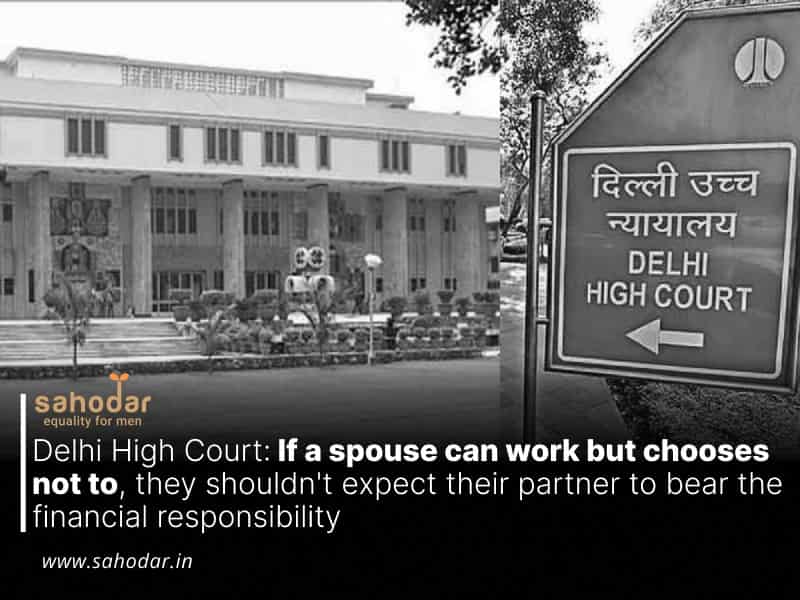The Court also noted that the provision for maintenance during the pendency of proceedings under the Hindu Marriage Act (HMA) is gender neutral, meaning that both wife or husband can seek relief under it.
The Delhi High Court, convened on Tuesday, enunciated the principle that a spouse, possessing reasonable employable skills but voluntarily opting for unemployment without adequate justification, should be precluded from imposing financial obligations, specifically in the form of maintenance, upon the other spouse.
This judicial determination emanated from the bench comprising Justice V Kameswar Rao and Justice Anoop Kumar Mendiratta. The court’s scrutiny and subsequent reduction of the maintenance granted by a family court to a wife were contextualized within the framework of ongoing divorce proceedings initiated by her husband.
“The spouse having a reasonable capacity of earning but who chooses to remain unemployed and idle without any sufficient explanation or indicating sincere efforts to gain employment should not be permitted to saddle the other party with one sided responsibility of meeting out the expenses,” the bench said.
The Court underscored that the quantification of maintenance need not be characterized by exact mathematical precision but should be oriented towards affording assistance to a spouse unable to independently sustain themselves throughout the duration of legal proceedings.
Additionally, the Court emphasized the gender-neutral applicability of maintenance provisions under the Hindu Marriage Act (HMA). Sections 24 and 25 of the HMA delineate the respective rights, liabilities, and obligations arising within the marital relationship, as elucidated by the Court.
In the instant case adjudicated by the High Court, the appellant (husband) contested a directive mandating a monthly payment of ₹30,000 to the respondent (wife) during the pendency of divorce proceedings.
The legal representative for the appellant argued that a prior order under the Protection of Women from Domestic Violence Act had obligated a monthly payment of ₹21,000, subsequently augmented to ₹30,000 within the ambit of HMA proceedings. The appellant, citing financial constraints, disclosed that the respondent, a Delhi University graduate, had previously earned ₹25,000 as a hospital receptionist.
The Court was apprised of the appellant’s responsibilities towards supporting his siblings, brother, and elderly parents, in addition to repaying a loan incurred for his brother’s matrimonial expenses.
Contrastingly, the respondent’s counsel contended that she did not receive a salary from her current hospital engagement, characterizing her role as that of a voluntary social worker.
Following a comprehensive evaluation of submissions and financial records, the Court ascertained that the appellant’s net income, post-deductions and recoveries, amounted to ₹56,492. Furthermore, the Court noted a lack of elucidation by the Family Court regarding the rationale for the augmented maintenance award to the respondent during the divorce proceedings.
In consideration of the appellant’s longstanding familial obligations antedating the legal dispute, coupled with the absence of evidence indicating that the deductions from his income were exclusively attributable to the litigation, the Court arrived at its decision.
With regard to the wife’s capacity to earn, the Court said she has a reasonable educational background from Delhi University but “appears to have voluntarily undertaken social work as claimed despite there being no impediment for undertaking a meaningful employment.”Top of Form
So, the Court decided to lower the money the husband has to give each month from ₹30,000 to ₹21,000. But, they also said that every year, the amount will go up by ₹1,500 to keep up with the increasing prices and expenses.
The husband had lawyers named Aditya Gaur and Krishan Bhardwaj.
The wife had a team of lawyers – Sachin Bansal, Arti Sharma, Sakshi Mahajan, and Gaurav Chauhan.

